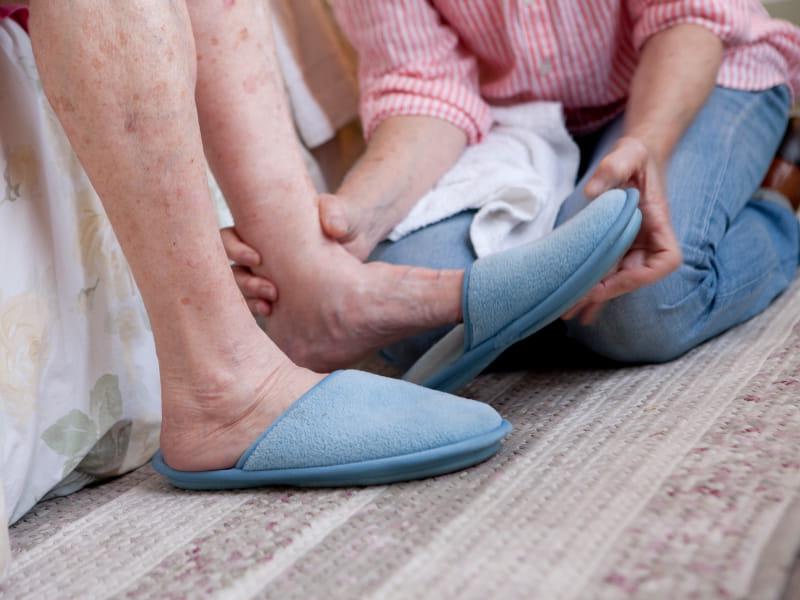Caregiving is never easy, and COVID-19 has made it harder
By Karen Patterson, American 心 Association 沙巴足球体育平台

梅莉亚·威尔金森(Melia Wilkinson)照顾她的丈夫克里(Kerry),他在2014年严重中风.
今天, the 57-year-old has no use of his left hand, limited use of his left leg, and relies on a cane to get around the house. Kerry can do many things on his own, 米利亚说, but she helps him with daily activities, 比如穿衣, and manages his medical care.
虽然护理一直是一项挑战,但COVID-19时代充满了新的焦虑.
“我们没有亲人,”她说. "I 担心 if I get COVID, there isn't a person who could step in."
这对夫妇和他们十几岁的女儿住在华盛顿州金县西雅图附近.S. coronavirus hotbed, and far from relatives. 自从病毒出现, Melia has discontinued housekeeping help, 社交距离使他们的朋友和前同事的小圈子变得遥不可及.
临床心理学家和卫生保健顾问Barry J. 雅可布. 对于那些在家需要帮助的亲人来说,长期的健康助手现在可能无法获得帮助. 或者,家庭可能会在是否允许外部助手继续照顾病人之间左右为难, risking coronavirus exposure, versus taking over that care – or letting the care gap go unfilled.
"I have seen families struggle with all of that,雅各布斯说. "These are very difficult choices."
对于独自生活的亲人来说,他们是否安全,是否能满足个人需求是一个至关重要的考验.
"Does it seem like they are eating? 睡觉? 吃药?老年学高级实践护士协会全国主席黛博拉·邓恩说. "When the medications are messed up or they have a bruise on their hip, now you have to make other choices.“这些选择包括将某人转移到高级护理机构,或者如果那里发生COVID-19,将他们转移出去.
"There are no right answers here, 在很多情况下,你需要在糟糕的选择中做出最好的决定,雅各布斯说, who writes about caregiving for AARP. “人们不应该因为结果不理想而自责. 我们必须承认,我们正在尽我们所能,用我们所能积蓄的最大的爱做最好的事情."
Caregivers also must navigate a radically changed health care system.
根据居家令,梅利亚不得不取消了六次必要的医疗预约. She worries about access to her husband's 药物, including a seizure drug that recently was sold out at her usual pharmacy. "He can't go a day without his regular medications," she said.
在日常护理中, telehealth is filling some gaps, Dunn说, 利沃尼亚麦当娜大学研究生院的教授和院长, 密歇根. 但COVID-19封锁已将更多检测和分类健康问题的负担转移给了家庭.
邓恩建议家庭编制一份便于查阅的亲人病情清单, 药物, health care providers and pharmacy, and to monitor supplies such as glucose testing strips. "It's that preparedness plan you never need, until you need it," she said.
Caregivers also have to be vigilant for COVID-19. Older adults or people of any age with underlying health problems, 包括肺部疾病, serious heart conditions or diabetes, should get medical advice as soon as coronavirus symptoms start, the Centers for Disease Control and Prevention says.
To avoid bringing the virus home, 邓恩建议护理人员采取常规的预防措施,并将一些杂务集中到一次旅行中, 然后按照医院工作人员的程序:在完成最后一次任务后,丢弃手套等一次性用品, then wash hands (or use sanitizer) if possible. 回到家后,在车库里换衣服,把衣服扔进洗衣机,洗个澡. 把鞋子放在外面.
If caring for a COVID-19 patient at home, the CDC provides extensive advice, 包括液体, rest and 药物 like acetaminophen if helpful; avoiding sharing personal items and space such as bathrooms; and disinfecting "high-touch" items such as doorknobs and faucets.
COVID-19 can arise subtly – perhaps a runny nose, Dunn said. 行为的改变, 食欲下降, 咳嗽或神志不清都是需要就医的症状. 也, 老年患者, "we don't wait for a 101-degree fever; if it's two degrees above baseline, 担心." If breathing or mental status declines, hospitalization is likely.
When a caregiver takes a loved one to the hospital, now that visitors typically are excluded, "the advice I would give is, say everything that needs to be said beforehand,雅各布斯说. “你会带着很多恐惧进入那种情况,但也希望一切都会好起来."
随着冠状病毒带来的额外压力,护理人员也必须寻求帮助. 只要有可能, recruit friends and family to get food, 药物 and other necessities, 雅各布斯建议.
“如果你过去曾犹豫过寻求帮助,现在是时候把它放在一边了. Every family member needs to understand this is a crisis, and we all need to step up and do more for the people we love."
Relatives can remotely manage finances or other paperwork. They also can work harder to be in touch. 研究表明,社交孤立和孤独对身心都是不健康的.
"Older adults in particular are more prone to getting depressed, 感到孤独, 如果他们感觉与世界的联系更好,他们可能会变得更有能力,雅各布斯说. “重要的是,他们意识到自己被关心、被关心——他们并不孤单."
找到 护理小贴士 during the coronavirus pandemic.
编者注:由于围绕冠状病毒的沙巴体育平台点击进入迅速演变, 本文中提供的事实和建议自出版以来可能已经发生了变化. 访问 心.org 获取最新报道, 并向疾病控制和预防中心以及当地卫生官员咨询最新的指导意见.
If you have questions or comments about this story, please email (电子邮件保护).





